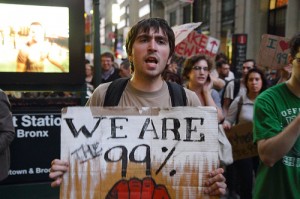 “We are 99 percent!” This is the slogan of the Wall Street occupiers. This huge rally in support of the U.S. financial reform, taken place in New York in 2008, suggests the degree to which people resented the unethical actions of financial institutions at Wall Street regarding predatory marketing of subprime loans and derivatives. The loans and derivatives were abusively sold by the unscrupulous marketers (or lenders). The financial institutions include investment banks, insurance companies, and real estate companies such as Lehman Brothers, JPMorgan, Citigroup, Goldman Sachs, AIG, American Home Mortgage Investment Corporation, and so on. They were involved in predatory mortgage lending, and abusive derivatives. Without scrutinizing the credibility of subprime borrowers, and overlooking their default risks, those institutions promoted loans and derivatives in order to attain satisfactory result, like short-term bonuses. Moreover, this lack of financial integrity had great impact on the global economy through a domino effect. Lehman Brothers went bankrupt, which led to the bailout of many other financial institutions such as AIG. Consequently, a great number of households across many nations suffered from huge layoffs, unemployment, foreclosures of properties including houses, and debt-ridden lives.
“We are 99 percent!” This is the slogan of the Wall Street occupiers. This huge rally in support of the U.S. financial reform, taken place in New York in 2008, suggests the degree to which people resented the unethical actions of financial institutions at Wall Street regarding predatory marketing of subprime loans and derivatives. The loans and derivatives were abusively sold by the unscrupulous marketers (or lenders). The financial institutions include investment banks, insurance companies, and real estate companies such as Lehman Brothers, JPMorgan, Citigroup, Goldman Sachs, AIG, American Home Mortgage Investment Corporation, and so on. They were involved in predatory mortgage lending, and abusive derivatives. Without scrutinizing the credibility of subprime borrowers, and overlooking their default risks, those institutions promoted loans and derivatives in order to attain satisfactory result, like short-term bonuses. Moreover, this lack of financial integrity had great impact on the global economy through a domino effect. Lehman Brothers went bankrupt, which led to the bailout of many other financial institutions such as AIG. Consequently, a great number of households across many nations suffered from huge layoffs, unemployment, foreclosures of properties including houses, and debt-ridden lives.
Many Wall Street institutions were caught in complicated financial situations through a misusage of investors’ capital in order to magnify their own profit/interests. Without a sufficient monitoring and regulation system, Wall Street might repeatedly get involved in unethical deals, and find loopholes to get around the law. To prevent a reoccurrence of the financial crisis and to improve transparency in management, regulations for financial institutions should be heavily reinforced. Therefore, the U.S. government should make strict guidelines for financial markets to assure ethical soundness.
